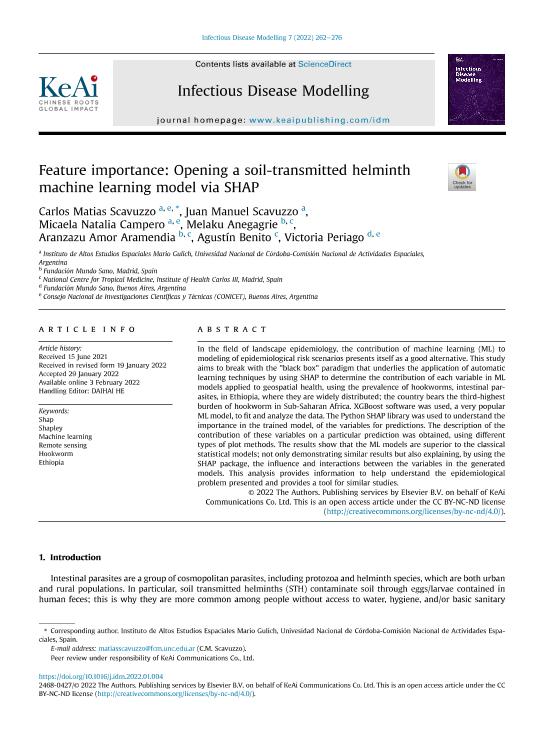Mostrar el registro sencillo del ítem
dc.contributor.author
Scavuzzo, Carlos Matias

dc.contributor.author
Scavuzzo, Juan Manuel
dc.contributor.author
Campero, Micaela Natalia

dc.contributor.author
Anegagrie, Melaku
dc.contributor.author
Aramendia, Aranzazu Amor
dc.contributor.author
Benito, Agustín
dc.contributor.author
Periago, Maria Victoria

dc.date.available
2023-06-16T14:50:11Z
dc.date.issued
2022-03
dc.identifier.citation
Scavuzzo, Carlos Matias; Scavuzzo, Juan Manuel; Campero, Micaela Natalia; Anegagrie, Melaku; Aramendia, Aranzazu Amor; et al.; Feature importance: Opening a soil-transmitted helminth machine learning model via SHAP; KeAi Communications Co.; Infectious Disease Modelling; 7; 1; 3-2022; 262-276
dc.identifier.issn
2468-0427
dc.identifier.uri
http://hdl.handle.net/11336/200813
dc.description.abstract
In the field of landscape epidemiology, the contribution of machine learning (ML) to modeling of epidemiological risk scenarios presents itself as a good alternative. This study aims to break with the ”black box” paradigm that underlies the application of automatic learning techniques by using SHAP to determine the contribution of each variable in ML models applied to geospatial health, using the prevalence of hookworms, intestinal parasites, in Ethiopia, where they are widely distributed; the country bears the third-highest burden of hookworm in Sub-Saharan Africa. XGBoost software was used, a very popular ML model, to fit and analyze the data. The Python SHAP library was used to understand the importance in the trained model, of the variables for predictions. The description of the contribution of these variables on a particular prediction was obtained, using different types of plot methods. The results show that the ML models are superior to the classical statistical models; not only demonstrating similar results but also explaining, by using the SHAP package, the influence and interactions between the variables in the generated models. This analysis provides information to help understand the epidemiological problem presented and provides a tool for similar studies.
dc.format
application/pdf
dc.language.iso
eng
dc.publisher
KeAi Communications Co.

dc.rights
info:eu-repo/semantics/openAccess
dc.rights.uri
https://creativecommons.org/licenses/by-nc-nd/2.5/ar/
dc.subject
ETHIOPIA
dc.subject
HOOKWORM
dc.subject
MACHINE LEARNING
dc.subject
REMOTE SENSING
dc.subject
SHAP
dc.subject
SHAPLEY
dc.subject.classification
Otras Ciencias de la Computación e Información

dc.subject.classification
Ciencias de la Computación e Información

dc.subject.classification
CIENCIAS NATURALES Y EXACTAS

dc.title
Feature importance: Opening a soil-transmitted helminth machine learning model via SHAP
dc.type
info:eu-repo/semantics/article
dc.type
info:ar-repo/semantics/artículo
dc.type
info:eu-repo/semantics/publishedVersion
dc.date.updated
2023-06-12T12:25:28Z
dc.journal.volume
7
dc.journal.number
1
dc.journal.pagination
262-276
dc.journal.pais
China

dc.description.fil
Fil: Scavuzzo, Carlos Matias. Consejo Nacional de Investigaciones Científicas y Técnicas. Centro Científico Tecnológico Conicet - Córdoba; Argentina. Comision Nacional de Actividades Espaciales. Instituto de Altos Estudios Espaciales "Mario Gulich"; Argentina
dc.description.fil
Fil: Scavuzzo, Juan Manuel. Comision Nacional de Actividades Espaciales. Instituto de Altos Estudios Espaciales "Mario Gulich"; Argentina
dc.description.fil
Fil: Campero, Micaela Natalia. Consejo Nacional de Investigaciones Científicas y Técnicas. Centro Científico Tecnológico Conicet - Córdoba; Argentina. Comision Nacional de Actividades Espaciales. Instituto de Altos Estudios Espaciales "Mario Gulich"; Argentina
dc.description.fil
Fil: Anegagrie, Melaku. Fundación Mundo Sano; Argentina. Instituto de Salud Carlos III; España
dc.description.fil
Fil: Aramendia, Aranzazu Amor. Fundación Mundo Sano; Argentina. Instituto de Salud Carlos III; España
dc.description.fil
Fil: Benito, Agustín. Instituto de Salud Carlos III; España
dc.description.fil
Fil: Periago, Maria Victoria. Consejo Nacional de Investigaciones Científicas y Técnicas; Argentina. Fundación Mundo Sano; Argentina
dc.journal.title
Infectious Disease Modelling
dc.relation.alternativeid
info:eu-repo/semantics/altIdentifier/url/https://linkinghub.elsevier.com/retrieve/pii/S2468042722000045
dc.relation.alternativeid
info:eu-repo/semantics/altIdentifier/doi/http://dx.doi.org/10.1016/j.idm.2022.01.004
Archivos asociados
